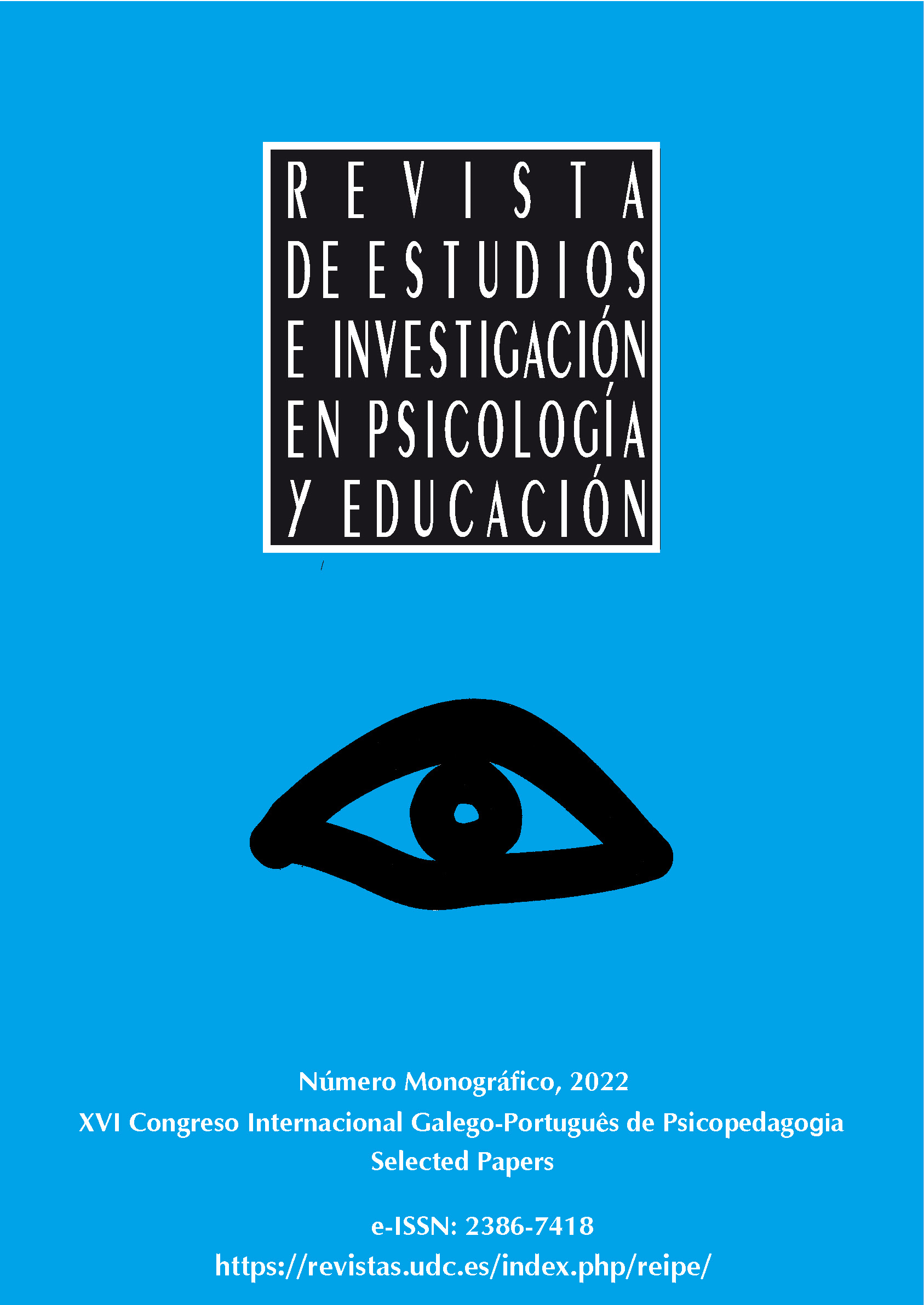Inteligência emocional e gestão de conflito na interação pedagógica
Contido principal do artigo
Resumo
Vários estudos mostram a relação entre as capacidades da inteligência emocional e a gestão de conflito nas relações pessoais. No entanto, são escassos os que investigam estes constructos na interação professor-aluno. Para colmatar esta lacuna, este estudo teve por objetivo investigar como as capacidades da inteligência emocional do professor influenciam as estratégias usadas para gerir o conflito na aula. Entende-se por estratégias de gestão de conflito os tipos de comportamentos que se adotam para gerir o conflito. A amostra incluiu 431 professores, de escolas públicas portuguesas. Foram aplicados o Questionário de Inteligência Emocional do Professor, e o Rahim Organizational Conflict Inventory II - Portuguese Version in School Context. Usando a técnica de modelação de equações estruturais, os resultados mostraram que os professores que tendem a pontuar mais alto nas capacidades emocionais da inteligência emocional usam mais estratégias de integração e de compromisso para gerir o conflito. Os resultados sugerem que as capacidades emocionais do professor são promotoras do uso de estratégias mais adequadas à gestão de conflitos, em contexto de aula. Em conclusão, o desenvolvimento das capacidades de inteligência emocional dos professores é uma prioridade, dado o seu papel interativo antes e durante o conflito. Neste sentido, defende-se um modelo educativo que dê prioridade às capacidades emocionais na formação inicial de professores, e que promova programas de intervenção que desenvolvam essas capacidades nos professores em serviço, como recurso primordial à gestão de conflitos na relação pedagógica.
Palavras-chave:
Entidades:
Downloads
Detalles do artigo
Referências
Chan, J. C. Y., Sit, E. N. M., & Lau, W. M. (2014). Conflict management styles, emotional intelligence and implicit theories of personality of nursing students: A cross-sectional study. Nurse Education Today, 34, 934–939. https://doi.org/10.1016/j.nedt.2013.10.012
Desivilya, H. S., & Yagil, D. (2005). The role of emotions in conflict management: The case of work teams. The International Journal of Conflict Management, 16(1), 55–69
https://doi.org/10.1108/eb022923
Doğan, S. (2016). Conflicts management model in school: A mixed design study. Journal of Education and Learning, 5(2), 200–219. https://doi.org/10.5539/jel.v5n2p200
Godse, A. S., & Thingujam, N. S. (2010). Perceived emotional intelligence and conflict resolution styles among information technology professionals: Testing the mediating role of personality. Singapore Management Review, 32(1), 69–83.
Hopkins, M. M., & Yonker, R. D. (2015). Managing conflict with emotional intelligence: Abilities that make a difference. Journal of Management Development, 34(2), 226–244. https://doi.org/10.1108/JMD-04-2013-0051
Jordan, P., & Troth, A. (2004). Managing emotions during team problem solving: Emotional intelligence and conflict resolution. Human Performance, 17(2), 195–218. https://doi.org/10.1207/s15327043hup1702_4
Marôco. J. (2018). Análise estatística com o SPSS statistics (7th ed.). Report Number. Lda.
Martins, A. M., & Alves, M. G. (2019). Conflitos em escolas públicas em Portugal: Análise de um programa de governo. Ensaio: Avaliação e Políticas Públicas em Educação, 27(102), 9–23. https://doi.org/10.1590/s0104-40362018002701628
Mora, F. (2021). Neuroeducación: Solo se pode aprender aquello que se ama (3th ed.). Alianza editorial.
Mayer, B. (2000). The dynamics of conflict resolution. Jassey-Bass
Mayer, J. D., & Salovey, P. (1997). What is Emotional Intelligence? In P. Salovey & J. Sluyter (Eds.), Emotional Development and Emotional Intelligence: Implications for Educators (pp. 3–31). Basic Books.
Pérez-de-Guzmán, M. V., Vargas, M., & Amador Munõz, L. V. (2011). Resolución de conflictos en las aulas: Un análisis desde la Investigación-Acción. Pedagogía Social: Revista Interuniversitaria, 18, 99–114. https://doi.org/10.7179/PSRI_2011.18.08
Rahim, M. (2002). Toward a theory of managing organizational conflict. International Journal of Conflict Management, 13(3), 206–235. https://doi.org/10.1108/eb022874
Sánchez-Álvarez, N., Extremera, N., & Fernández-Berrocal, P. (2016). The relation between emotional intelligence and subjective well-being: A meta-analytic investigation. The Journal of Positive Psychology, 11(3), 276–285. https://doi.org/10.1080/17439760.2015.1058968
Silva, F. & Flores, P. (2014). O conflito em contexto escolar: transformar barreiras em oportunidade. In M. Carvalho, A. Loureiro & C. Ferreira (Org.), XII Congresso da Sociedade Portuguesa de Ciências da Educação, Ciências da Educação: espaços de investigação, reflexão e ação interdisciplinar (pp. 253–268). De Facto Editores. http://xiicongressospce2014.utad.pt/
Valente, S., Monteiro, A. P., & Lourenço, A. A. (2017). Adaptação e validação da escala de gestão de conflitos entre professores-alunos. Revista de Estudios e Investigación en Psicología y Educación, 2, 41–45. https://doi.org/10.17979/reipe.2017.0.02.2512
Valente, S. (2019). Influência da inteligência emocional na gestão de conflito na relação professor-aluno(s). Revista de Estudios e Investigación en Psicología y Educación, 6(2), 101–113. https://doi.org/10.17979/reipe.2019.6.2.5786
Valente, S., & Almeida, L. S. (2020). Educação emocional no Ensino Superior: Alguns elementos de reflexão sobre a sua pertinência na capacitação de futuros professores. Revista E-Psi, 9(1), 152–164. https://revistaepsi.com/artigo/2020-ano9-volume1-artigo10/
Valente, S., & Lourenço, A. A. (2020a). Emotional intelligence makes a difference: The impact of teachers’ emotional intelligence abilities on conflict management strategies in the classroom. Know and Share Psychology, 1(4), 123–134. https://doi.org/10.25115/kasp.v1i4.4249
Valente, S., & Lourenço, A. A. (2020b). Questionário de inteligência emocional do professor: adaptação e validação do Emotional Skills and Competence Questionnaire. Revista de Estudios e Investigación en Psicología y Educación, 7(1), 101–113. https://doi.org/10.17979/reipe.2020.7.1.5480
Villamediana, J., Donado, A., & Zerpa, C. E. (2015). Estratégias de manejo de conflictos, inteligencia emocional y desarrollo moral. Revista Dimensión Empresarial, 13(1), 73–94. http://ojs.uac.edu.co/index.php/dimension-empresarial/article/view/339



